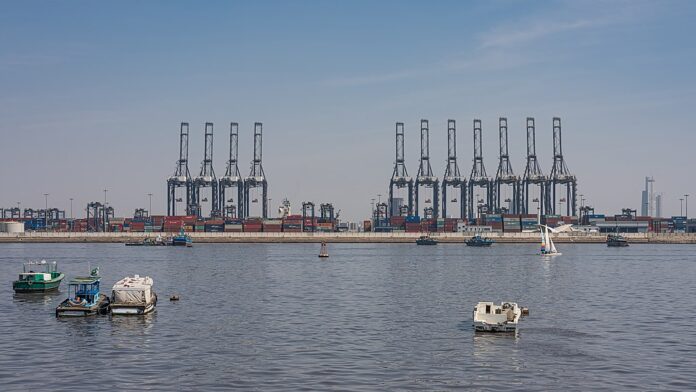Agreement to enhance Karachi Port Trust’s logistics and infrastructure with a new shipbreaking project
Pakistan is poised to finalize a $2 billion investment agreement with a prominent European shipping company by October 2024, according to Qaiser Ahmed Sheikh, Pakistan’s Maritime Affairs Minister. This announcement signals growing global interest in Pakistan’s maritime sector, particularly its ports.
This development follows the recent visit of AP Moller–Maersk’s Chief Executive Officer, Keith Svendsen, to Pakistan. During his visit, Svendsen engaged with top Pakistani officials to explore investment opportunities in the country’s maritime infrastructure. The minister’s statement on Thursday highlighted the European firm’s commitment to enhancing logistics and infrastructure at the Karachi Port Trust (KPT).
“A well-known European company has shown interest in investing $2 billion in Karachi Port Trust,” Sheikh announced. Although he did not specify the company’s name, he revealed that the memorandum of understanding is expected to be signed by October.
Embed from Getty ImagesSheikh also mentioned the firm’s plans to establish a shipbreaking project in Pakistan, aiming to dismantle 750 ships. This initiative is set to boost local employment as the company has committed to training Pakistani youth for the project.
The maritime sector in Pakistan is gaining momentum, with Danish shipping giant Maersk expressing a strong interest in investing in the country. Sheikh confirmed earlier discussions with Maersk regarding potential investments in terminals and port infrastructure, including connecting bridges. “We had very good discussions with them, and they had shown eagerness, telling us they will submit a proposal in a few days,” Sheikh stated on May 7. “They want to take a terminal. There is some area where there is depth in the sea, where big ships can be anchored.”
Maersk has established itself as a key player in Pakistan’s logistics and supply-chain services, holding approximately 20 per cent market share in the nation’s containerized import-export activities, as per Pakistan’s information ministry. In January, the Danish firm unveiled new smart logistics and warehouse facilities in China, Norway, and Pakistan.
“With a vast network of warehousing and depot facilities across the country, including our flagship logistics hub in Port Qasim, Karachi—a sprawling 27-acre complex encompassing over 650,000 square feet of warehouse space—we ensure unparalleled support to Pakistani exporters and importers,” Maersk stated in a written response to Arab News. “Maersk now operates over a 1.5 million square feet footprint across seven cities in Pakistan.”
This potential investment by the European company is not the only significant development in Pakistan’s maritime sector. The South Asian nation recently inked an agreement with Abu Dhabi Ports Group, securing a $395 million investment for developing a container and cargo terminal under a government-to-government (G2G) agreement between the United Arab Emirates and Pakistan.
Analysis:
A European shipping firm’s anticipated $2 billion investment in Karachi Port Trust signifies a crucial step towards enhancing Pakistan’s maritime infrastructure. This development reflects a broader trend of increasing international interest in Pakistan’s ports, driven by the strategic location and potential for growth in the region’s logistics and shipping sectors.
From an economic perspective, the investment will likely benefit Pakistan’s economy significantly. Improved logistics and infrastructure at Karachi Port Trust can enhance trade efficiency, reduce shipping costs, and attract more international business. The shipbreaking project, set to dismantle 750 ships, will create numerous jobs and contribute to the local economy. Furthermore, the commitment to training Pakistani youth aligns with the government’s skill development and employment generation goals, which are crucial for economic growth.
Politically, this investment reinforces Pakistan’s strategic alliances with European nations. Despite regional challenges, it highlights the country’s ability to attract substantial foreign direct investment (FDI). The engagement with European firms, along with existing collaborations with entities like Abu Dhabi Ports Group, showcases Pakistan’s proactive approach to leveraging international partnerships to boost its maritime capabilities.
From a sociological viewpoint, the focus on youth training and employment is particularly significant. It addresses the pressing issue of unemployment among the young population in Pakistan, providing them with skills and opportunities in a growing sector. This initiative can lead to long-term socio-economic benefits, fostering a skilled workforce capable of contributing to various industries beyond maritime services.
The involvement of Maersk, a major player in the global shipping industry, underscores the strategic importance of Pakistan’s ports. Maersk’s existing footprint in Pakistan, with extensive warehousing and logistics facilities, indicates the potential for further expansion and investment. The company’s interest in developing terminals and port infrastructure can lead to enhanced capabilities for handling large ships, making Pakistan a pivotal node in global shipping routes.
From a gender perspective, the maritime sector has traditionally been male-dominated. However, large-scale investments and the establishment of new projects may create opportunities to promote gender diversity within the industry. Ensuring inclusive hiring practices and providing training for women can help address gender disparities and empower women in maritime roles.
The minority and marginalized communities in Pakistan may also benefit from these developments. By creating jobs and fostering skill development, the investment can contribute to reducing socio-economic disparities. Inclusive policies and targeted programs can ensure that the benefits of such investments are equitably distributed among all segments of society.
In conclusion, the expected $2 billion investment in Karachi Port Trust represents a significant milestone for Pakistan’s maritime sector. It brings economic, political, and social benefits, reinforcing the country’s strategic importance in global shipping. With a focus on infrastructure enhancement, job creation, and skill development, this investment holds the potential to drive substantial progress in Pakistan’s economic and social landscape.
